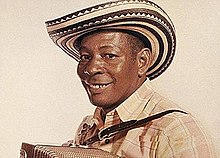| This article needs additional citations for verification. Please help improve this article by adding citations to reliable sources. Unsourced material may be challenged and removed. Find sources: "Alejo Durán" – news · newspapers · books · scholar · JSTOR (September 2013) (Learn how and when to remove this message) |
| Alejo Durán | |
|---|---|
 Alejandro Durán Alejandro Durán | |
| Background information | |
| Birth name | Gilberto Alejandro Durán Díaz |
| Born | (1919-02-09)February 9, 1919 El Paso, Cesar, Colombia |
| Died | November 15, 1989(1989-11-15) (aged 70) Montería, Córdoba, Colombia |
| Genres | Vallenato |
| Occupation(s) |
Singer, Composer |
Gilberto Alejandro Durán Diaz, known to all as Alejo Durán or "El Negro Grande" (the great black Man) (February 9, 1919 – November 15, 1989) was a Colombian vallenato music traditional composer, singer and accordionist.
Duran was born in El Paso, Cesar and for most of his life he worked as a cowboy. He is notorious for lyrically "self-flagellating" himself in his songs. In 1968 Duran gained notoriety for winning the first version of the "Vallenato Legend Festival" in the city of Valledupar and is often cited as one of the best Vallenato musicians of all times. He died in Montería, Córdoba.
Colombian musician Carlos Vives did cover versions of his songs.
Popular songs he wrote include "Altos del Rosario", "Pedazo de Acordeón," "Fidelina," and "La Cachucha Bacana".
References
- ^ Huband-Thompson, Tobias. "Alejo Durán (1919-1989) - Colombia's first king of Vallenato | Latino Life". www.latinolife.co.uk. Retrieved September 16, 2021.
- Broughton, Simon (1994). World music : the rough guide. The Archive of Contemporary Music. London : Rough Guides. ISBN 978-1-85828-017-2.
This article on a singer-songwriter is a stub. You can help Misplaced Pages by expanding it. |
This article on a Colombian musician is a stub. You can help Misplaced Pages by expanding it. |